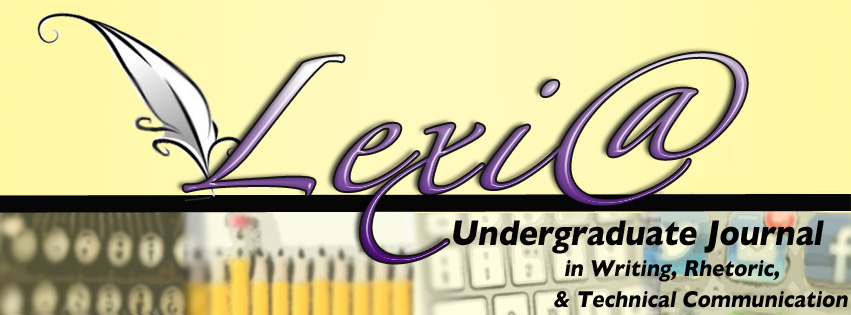
Lexia was a student-run online journal that published innovative student work produced by students in The School of Writing, Rhetoric & Technical Communication from 2013 to 2017. The journal's mission was to publish a range of texts that best represent the students and faculty of WRTC, as well as the disciplines of writing, rhetoric and technical communications.
Looking Toward the Future
The WRTC Journal is growing!
First there was e-Vision - Journal of First-Year Writing (2000 - 2012).
Then there was the Lexia Undergraduate Journal (2013 - 2017).
What's next? That's what the WRTC 328 Practicum students will be deciding during the 2017 - 2018 academic year. Stay tuned as they explore rebranding and preparing the journal to accept submissions from students working in comparable, stand-alone writing studies programs in the U.S. Plans are underway to reopen submissions in the fall of 2018 with publication of the first issue in spring of 2019.
Lexia Undergraduate Journal (2013 - 2017)
The School of Writing, Rhetoric and Technical Communication launched a new journal and a new website in place of e-Vision in April 2013. Lexia was a student-run online journal that published innovative student work produced by students in The School of Writing, Rhetoric & Technical Communication. The mission was to publish a range of texts that best represent the students and faculty of WRTC, as well as the disciplines of writing, rhetoric and technical communications.
e-Vision - Journal of First-Year Writing (2000 - 2012)
In its inaugural year, e-Vision was produced by both students and members of The Writing Program faculty. A student editorial board, with nominal guidance from The Writing Program faculty, chose the eight essays published in the first issue. The careful selection process began with several meetings of the student editorial board in January of 2000, during which the board established the criteria used to evaluate and identify essays which best fulfilled expectations of excellence. The rubric, created by student editors, rated essays on the basis of their logical, thoughtful, incisive development of ideas expressed in clear, inventive, compelling voices of concern. Over the summer of 2000 and into the Spring 2001 semester, student editors read and selected from the 120 essays submitted to e-Vision by both Writing Program faculty and students involved in GWRIT 101 and 102 classes in the Spring 2000/Fall 2000 semesters.

